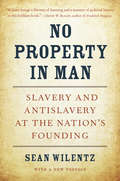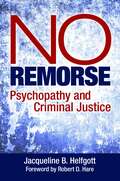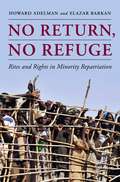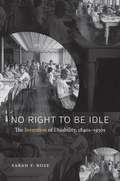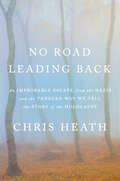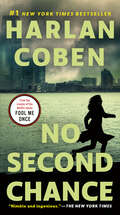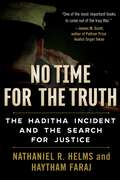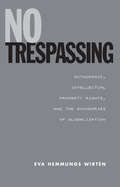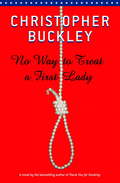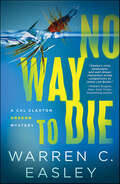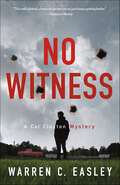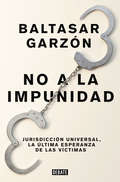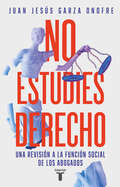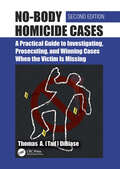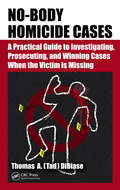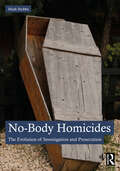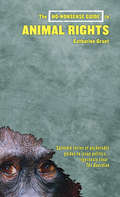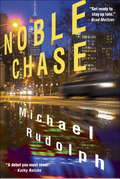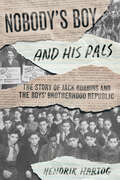- Table View
- List View
No Property in Man: Slavery and Antislavery at the Nation’s Founding, With a New Preface (The Nathan I. Huggins Lectures #18)
by Sean WilentzDriving straight to the heart of the most contentious issue in American history, Sean Wilentz argues controversially that, far from concealing a crime against humanity, the U.S. Constitution limited slavery’s legitimacy—a limitation which in time inspired the antislavery politics that led to Southern secession, the Civil War, and Emancipation.
No Remorse: Psychopathy and Criminal Justice
by Jacqueline B. HelfgottPsychopathy and Criminal Justice provides a comprehensive examination of the empirical research and cultural understanding of psychopathy. The book examines ways in which the construct and concept of psychopathy have made their way into criminological theory and criminal justice practice.<p><p>It offers a focused look at how the term "psychopath" is used and understood in law enforcement, the courts, corrections, victim services, and juvenile justice. Additionally, it examines historical, research, and cultural perspectives on psychopathy for understanding criminal behavior, exploring theories of and research into psychopaths, psychopathy and gender, and representations of psychopaths in film and literature.
No Return, No Refuge: Rites and Rights in Minority Repatriation
by Elazar Barkan Howard AdelmanRefugee displacement is a global phenomenon that has uprooted millions of individuals over the past century. In the 1980s, repatriation became the preferred option for resolving the refugee crisis. As human rights achieved global eminence, refugees' right of return fell under its umbrella. Yet return as a right and its practice as a rite created a radical disconnect between principle and everyday practice, and the repatriation of refugees and Internally Displaced Persons (IDPs) remains elusive in cases of forced displacement of victims by ethnic conflict.Reviewing cases of ethnic displacement throughout the twentieth century in Europe, Asia, and Africa, Howard Adelman and Elazar Barkan juxtapose the empirical lack of repatriation in cases of ethnic conflict, unless accompanied by coercion. The emphasis on repatriation during the last several decades has obscured other options, leaving refugees to spend years warehoused in camps. Repatriation takes place when identity, defined by ethnicity or religion, is not at the center of the displacing conflict, or when the ethnic group to which the refugees belong are not a minority in their original country or in the region to which they want to return. Rather than perpetuate a ritual belief in return as a right without the prospect of realization, Adelman and Barkan call for solutions that bracket return as a primary focus in cases of ethnic conflict.
No Right To Be Idle: The Invention Of Disability, 1850-1930
by Sarah F. Rose<P><P>During the late nineteenth and early twentieth centuries, Americans with all sorts of disabilities came to be labeled as "unproductive citizens." Before that, disabled people had contributed as they were able in homes, on farms, and in the wage labor market, reflecting the fact that Americans had long viewed productivity as a spectrum that varied by age, gender, and ability. But as Sarah F. Rose explains in No Right to Be Idle, a perfect storm of public policies, shifting family structures, and economic changes effectively barred workers with disabilities from mainstream workplaces and simultaneously cast disabled people as morally questionable dependents in need of permanent rehabilitation to achieve "self-care" and "self-support." <P><P> By tracing the experiences of policymakers, employers, reformers, and disabled people caught up in this epochal transition, Rose masterfully integrates disability history and labor history. She shows how people with disabilities lost access to paid work and the status of "worker--a shift that relegated them and their families to poverty and second-class economic and social citizenship. This has vast consequences for debates about disability, work, poverty, and welfare in the century to come.
No Road Leading Back: An Improbable Escape from the Nazis and the Tangled Way We Tell the Story of the Holocaust
by Chris HeathThis by turns shattering and hope-giving account of prisoners who dug their way to freedom from the Nazis is both a stunning escape narrative and an object lesson in the ways we remember and continually forget the particulars of the Holocaust.No Road Leading Back is the remarkable story of a dozen prisoners who escaped from the site where more than 70,000 Jews were shot in the Lithuanian forest of Ponar after the Nazi invasion of Eastern Europe in 1941. Anxious to hide the incriminating evidence of the murders, the S.S. later in the war enslaved a group of Jews to exhume every one of the bodies and incinerate them all in a months-long labor—an episode whose specifics are staggering and disturbing, even within the context of the Holocaust.From within that dire circumstance emerges the improbable escape made by some of the men, who dug a tunnel with bare hands and spoons while they were trapped and guarded day and night—an act not just of bravery and desperation but of awesome imagination. Based on first-person accounts of the escapees and on each scrap of evidence that has been documented, repressed, or amplified since, this book resurrects their lives, while also providing a complex, urgent analysis of why their story has rarely been told, and never accurately. Heath explores the cultural use and misuse of Holocaust testimony and the need for us to face it—and all uncomfortable historical truths—with honesty and accuracy.
No Safe Place: Toxic Waste, Leukemia and Community
by Phil Brown Edwin J. MikkelsenThis book documents the suffering and the difficulties born out of the Woburn case. It offers a clinical, yet compassionate glimpse into the minds of people for whom environmental contamination meant severe illness and often death and holds out a hope that through communal support and political action the world can be made a safer place.
No Seat at the Table: How Corporate Governance and Law Keep Women Out of the Boardroom (Critical America #26)
by Douglas M. BransonWomen are completing MBA and Law degrees in record high numbers, but their struggle to attain director positions in corporate America continues. Although explanations for this disconnect abound, neither career counselors nor scholars have paid enough attention to the role that corporate governance plays in maintaining the gender gap in America's executive quarters.Mining corporate governance models applied at Fortune 500 companies, hundreds of Title VII discrimination cases, and proxy statements, Douglas M. Branson suggests that women have been ill-advised by experts, who tend to teach females how to act like their male, executive counterparts. Instead, women who aspire to the boardroom should focus on the decision-making processes nominating committees—usually dominated by white men—employ when voting on membership.Filled with real-life cases, No Seat at the Table opens the closed doors of the boardroom and reveals the dynamics of the corporate governance process and the double standards that often characterize it. Based on empirical evidence, Branson concludes that women have to follow different paths than men in order to gain CEO status, and as such, encourages women to make flexible, conscious, and often frequent shifts in their professional behaviors and work ethics as they climb the corporate ladder.
No Second Chance
by Harlan CobenWhen the first bullet hit my chest, I thought of my daughter... Dr. Marc Seidman has been shot twice, his wife has been murdered, and his six-month-old daughter has been kidnapped.<P><> When he gets the ransom note-he knows he has only one chance to get this right. But there is nowhere he can turn and no one he can trust.
No State Shall Abridge: The Fourteenth Amendment and the Bill of Rights
by Michael Kent Curtis"The book is carefully organized and well written, and it deals with a question that is still of great importance--what is the relationship of the Bill of Rights to the states."--Journal of American History"Curtis effectively settles a serious legal debate: whether the framers of the 14th Amendment intended to incorporate the Bill of Rights guarantees and thereby inhibit state action. Taking on a formidable array of constitutional scholars, . . . he rebuts their argument with vigor and effectiveness, conclusively demonstrating the legitimacy of the incorporation thesis. . . . A bold, forcefully argued, important study."--Library Journal
No Stone Unturned: The True Story of the World's Premier Forensic Investigators
by Steve JacksonThe New York Times bestselling author takes readers on &“a fascinating journey into the trenches of crime [investigation]&”—now revised and updated (Lowell Cauffiel, New York Times bestselling author).A body stuffed in a car trunk swallowed by the swirling, muddy waters of the Missouri River. A hiker brutally murdered, then thrown off a steep embankment in a remote mountain range. A devious killer who hid his wife&’s body under a thick cement patio. For investigators, the story is often the same: they know a murder took place, they may even know who did it; but without key evidence, or a body, pursuing a conviction is nearly impossible. That&’s when they call NecroSearch International, a brain trust of the nation&’s top scientists in a wide variety of fields, who along with law enforcement, use the latest technology and field techniques to locate clandestine graves and hidden secrets to solve &“unsolvable&” crimes. In No Stone Unturned, Steve Jackson—who became a member of NecroSearch International in 2015—gives a captivating, insider&’s look into a realm of crime investigation of which few people are aware. &“The book covers the group&’s quirky beginnings and digs into its most important cases suspensefully; Jackson&’s sharp eye misses nothing in the painstakingly rendered details. A must-have for true crime fans, it should also be of great interest to anyone fascinated with the practical applications of science.&”—Publishers Weekly (starred review)&“Delves into cases that would make good novels, but they&’re real. Furthermore, he describes a group of uncommon people performing uncommon tasks, and he does it with respect, accuracy and genuine style.&”—Ron Franscell, bestselling author of Alice & Gerald: A Homicidal Love Story
No Timber Without Trees: Sustainability in the tropical forest (Natural Resource Management Set)
by Duncan PooreMuch of the world's tropical timber is still supplied from natural forest, but under current systems of management the forests are rapidly becoming exhausted. Unless management practices change to become genuinely sustainable, neither the forests nor the essential contribution of the timber industry to many economies will survive. Duncan Poore reviews the extent to which natural forests are already being sustainably managed for timber production, and looks at how these practices can be enlarged. He places management for timber in the wider context of tropical forest conservation and outlines a strategy for further action. Thoroughly researched and accessibly written, this book will be useful for everyone working or interested in the subject of tropical forests. Foreword by Dato Dr B.C.Y. Freezailah Originally published in 1989
No Time for the Truth: The Haditha Incident and the Search for Justice
by Nathaniel R. Helms Haytham FarajAn Unflinching Look at a Black Chapter in Our War in Iraq and America’s Failure to Serve Justice In the waning days of 2005, twelve Marines were ambushed by Sunni Muslim insurgents on Route Chestnut, an ancient Mesopotamian road at the south edge of Haditha, Iraq, when an IED detonated under one of four Humvees they occupied, killing or wounding a quarter of their number. The surviving Marines quickly counterattacked. Their merciless response killed twenty-four Iraqi citizens, including an old man and ten women and children. This horrific encounter was quickly dubbed the Haditha Massacre and compared to My Lai, and its echoes still resonate today. Prompted by international condemnation, the Pentagon and Marine Corps initiated court-martial proceedings against the Marines involved.No Time for the Truth is the first book to show how the subsequent seven-year investigation and trial?which resulted in only a single minor conviction?was no more than theater meant to appease an outraged public and salvage US-Iraq relations. Authors Nathaniel Helms and Haytham Faraj, who served as defense counsel, reveal how the Pentagon pressured prosecutors to protect the integrity of the Marine Corps by hiding the fully gruesome nature of killings perpetrated by ?battle-rattled” soldiers, with the intention of laying blame at the feet of a single staff sergeant. This is a stunning account of one of the darkest moments in the war in Iraq, a critical examination of whether justice was even sought after, and a powerful statement that in war, "truth is the first casualty.”Skyhorse Publishing, as well as our Arcade imprint, are proud to publish a broad range of books for readers interested in history—books about World War II, the Third Reich, Hitler and his henchmen, the JFK assassination, conspiracies, the American Civil War, the American Revolution, gladiators, Vikings, ancient Rome, medieval times, the old West, and much more. While not every title we publish becomes a New York Times bestseller or a national bestseller, we are committed to books on subjects that are sometimes overlooked and to authors whose work might not otherwise find a home.
No Trespassing
by Eva Hemmungs WirténIn this scholarly yet highly accessible work, Eva Hemmungs Wirtén traces three main themes within the scope of cultural ownership: authorship as one of the basic features of print culture, the use of intellectual property rights as a privileged instrument of control, and finally globalization as a pre-condition under which both operate. Underwritten by rapid technological change and increased global interdependence, intellectual property rights are designed to protect a production that is no longer industrial, but informational.No Trespassing tells the story of a century of profound change in cultural ownership. It begins with late nineteenth-century Europe, exploring cultural ownership in a number of settings across both spatial and temporal divides, and concludes in today's global, knowledge-based society. Wirtén takes an interdisciplinary and international approach, using a wide array of material from court cases to novels for her purposes. From Victor Hugo and the 1886 Berne Convention, to the translation of Peter Høeg?s bestseller Smilla's Sense of Snow, Wirtén charts a history of Intellectual property rights and regulations. She addresses the relationship between author and translator, looks at the challenges to intellectual property by the arrival of the photocopier, takes into account the media conglomerate's search for content as a key asset since the 1960s, and considers how a Western legal framework interacts with attempts to protect traditional knowledge and folklore. No Trespassing is essential reading for all who care about culture and the future regulatory structures of access to it.
No Undocumented Child Left Behind: Plyler v. Doe and the Education of Undocumented Schoolchildren (Citizenship and Migration in the Americas #3)
by Michael A. OlivasThe 1982 U. S. Supreme Court case of Plyler v. Doe, which made it possible for undocumented children to enroll in Texas public schools, was a watershed moment for immigrant rights in the United States. The Court struck down both a state statute denying funding for education to undocumented children and a municipal school district's attempt to charge an annual $1,000 tuition fee for each undocumented student to compensate for the lost state funding. Yet while this case has not returned to the Supreme Court, it is frequently contested at the state and local level.In No Undocumented Child Left Behind, Michael A. Olivas tells a fascinating history of the landmark case, examining how, 30 years later, Plyler v. Doe continues to suffer from implementation issues and requires additional litigation and vigilance to enforce the ruling. He takes a comprehensive look at the legal regime it established regarding the education of undocumented school children, moves up through its implementation, including direct and indirect attacks on it, and closes with the ongoing, highly charged debates over the Development, Relief, and Education for Minors (DREAM) Act, which aims to give conditional citizenship to undocumented college students who graduated from US high schools and have been in the country for at least five years. Listen to Michael Olivas on WYPF 88.1 FM, as he takes a look back 30 years to the Supreme Court case that made it possible for undocumented children to enroll in public schools and the highly-charged political and legal battles that have ensued.
No Way To Treat a First Lady: A Novel
by Christopher BuckleyA New York Times Notable Book of the YearElizabeth Tyler MacMann, the ambitious First Lady of the United States (and known in the tabloids as "Lady Bethmac"), is on trial for the death of her philandering husband, and the only man who can save her is the boyfriend she jilted in law school--now the most shameless defense attorney in America. Published to rave reviews, No Way to Treat a First Lady is a hilariously warped love story for our time set in the funniest place in America: Washington, D.C.
No Way to Die (Cal Claxton Mysteries #7)
by Warren C EasleyWhen nothing is as it seems, can the truth survive?Attorney Cal Claxton, now well-established in his Oregon law practice after breaking off his career as a high-powered LA prosecutor, just wants to go fishing with his daughter, Claire, and he knows the best place—the coastal area south of Coos Bay. But their vacation takes a dark turn with the discovery of a body in the river.As an investigation is launched into the suspicious death, Cal and Claire find themselves drawn into the life of the local bookshop owner and vocal environmental activist, whose grandson was convicted for murder at age sixteen. She believes he was wrongly accused and convinces Cal to reexamine the case. Together, Cal and Claire dig deep into the secrets and crumbling alliances that form the foundation of this small coastal community, and what they find could spell doom for them both...
No Witness: A Cal Claxton Mystery (Cal Claxton Mysteries #8)
by Warren C EasleyWhen the American Dream becomes a nightmare…Running a one-man law practice in the heart of Oregon's wine country, Cal Claxton hires a young, undocumented man as an assistant, hoping to give him an opportunity to create more stability for himself and his family. Timoteo Fuentes is a bright, hardworking student by day and Cal's legal clerk by night, juggling both roles with determination and grit. When one of Timoteo's family members is brutally murdered, the migrant community is reluctant to cooperate with the police investigation for fear of deportation.Devastated by the loss and nervous about engaging with the legal system, the family turns to Cal for help. With Timoteo protected as a "Dreamer" from deportation, the two begin a dangerous investigation of ruthless people who leverage the fear of a vulnerable population for profit and an assassin who is as cunning as he is deadly. Can Cal and Timoteo untangle the web of deceit or will they become victims themselves?
No a la impunidad: Jurisdicción Universal, la última esperanza de las víctimas
by Baltasar GarzónUn repaso fundamental a los abusos de derechos humanos cometidos por distintas dictaduras en el siglo XX. "Baltasar Garzón ha dedicado toda su vida a luchar contra la impunidad, sin amilanarse frente a los poderes políticos y económicos que la generan. Ha puesto su impecable preparación técnica y su impresionante coraje y disposición al servicio de la defensa de los derechos que poseen las víctimas de los más graves atropellos a la legalidad y la dignidad humana, aun a costa de un elevado sacrificio personal, ya que ciertamente su causa es impopular para los poderes legales y fácticos de muchos países. Este libro es un ejemplo bastante revelador de lo que he llamado "la razón caliente", aquella rara capacidad para combinar la argumentación jurídica impecable con el sentimiento de repulsa hacia la impunidad de los poderosos y, a la vez, de solidaridad con las víctimas. Precisamente, este es el libro de un hombre de derecho que hacede su estudio un instrumento de lucha contra la injusticia y la impunidad, y que al mismo tiempo acoge y pretende confortar a las víctimas." Del Prólogo de Boaventura de Sousa Santos
No estudies derecho
by Juan Jesús Garza OnofreUna invitación a no estudiar derecho el Derecho, para cambiar nuestra relación con las leyes que nos rigen y sus operadores. ¿Desde hace cuánto tiempo se dirá, a modo de chiste, que los abogados y los plátanos se parecen en que no hay uno derecho? ¿Por qué en México, a pesar de que se abre una nueva escuela de Derecho cada semana —¡hay más facultades de Derecho en Puebla que en todo Canadá!—, no vivimos en una cultura de la legalidad? ¿Por qué pareceque es necesario disfrazarse para ejercer la profesión o hablar en un idioma tan extraño que tiene su propio nombre: el abogañol? Algo anda mal con la formación y el papel que desempeñan los abogados en la sociedad. Quienes deberían fungir como garantes del Estado de Derechoe igualadores de los ciudadanos ante el sistema de justicia, muchas veces terminan como guardianes del statu quo y defensores de los intereses de unos cuantos. Por ello, la primera parte de este libro revisa con mirada crítica los principales vicios y obstáculos que afectan la labor de los abogados: desde el conservadurismo dentro del gremio hasta la dificultad para adaptarse a los cambios tecnológicos, pasando por el machismo y la uniformidad aplastante.Por supuesto, este libro no defiende la idea de un mundo sin abogados. De lo que se trata, nos dice Juan Jesús Garza Onofre, es de estudiar y practicar el Derecho de una forma distinta, con creatividad, empatía y tolerancia. Así, la segunda parte de No estudies Derecho ofrece múltiples salidas al atolladero descrito en la primera, para poder contar con mejores abogados y abogadas, libres de estereotipos anquilosados, y que ayuden a construir sociedades más justas.
No-Body Homicide Cases: A Practical Guide to Investigating, Prosecuting, and Winning Cases When the Victim Is Missing
by Thomas A.(Tad) DiBiaseA practical guide for police, death investigators, and prosecutors, No-Body Homicide Cases: A Practical Guide to Investigating, Prosecuting, and Winning Cases When the Victim is Missing, Second Edition takes an expansive look at both the history of no-body murder cases and the best methods to investigate, solve, and bring them to court. How do you prove someone guilty of murder when the best and primary piece of evidence—the victim’s body—is missing? Exclusively dedicated to the investigation and prosecution of no-body homicide cases, this fully updated Second Edition provides the author’s insight gained from investigating, consulting on, and trying scores of no-body cases throughout the United States. Taking readers step-by-step from the first days of a homicide investigation through the trial, the book explores the history of confessions and discloses the investigative techniques police must use to catch these cunning killers. Chapters review methods criminals have used to dispose of bodies, delving into the psychological profile of the type of defendant who murders someone, then hides the body. Since the last edition published, the number of no-body murder cases investigated has skyrocketed, with more than 50 percent of all no-body murder cases tried and prosecuted have occurred since the year 2000. New to this edition is a chapter on a full, singular high-profile case from start to finish, to illustrate the entire no-body investigative and adjudication process. A sample arrent warrant for a no-body murder case is provided in addition to Chapter 12 updating the prior edition’s nearly 400 case summaries provided to the current figure, as of this publication, of 576 no-body murder trials in U.S. history. No-Body Homicide Cases, Second Edition continues to serve as an essential resource and the "how-to" manual for investigating, prosecuting, and winning no-body murder cases.
No-Body Homicide Cases: A Practical Guide to Investigating, Prosecuting, and Winning Cases When the Victim Is Missing
by Thomas A.(Tad) DiBiaseHow do you prove someone guilty of murder when the best piece of evidence the victim‘s body is missing? Exclusively dedicated to the investigation and prosecution of no-body homicide cases, this book provides the author‘s insight gained from investigating and trying a no-body case along with what he‘s learned consulting on scores of others across t
No-Body Homicides: The Evolution of Investigation and Prosecution
by Mark StobbeNo-Body Homicides: The Evolution of Investigation and Prosecution examines how police and prosecutors have become more successful in obtaining convictions for homicide when the remains of the victim are unavailable as evidence. Based on an examination of over 600 cases in the United States and Canada, this book shows the length some killers will go to avoid punishment and the determination of police and prosecutors to bring them to justice. For over 300 years, murderers in the United States and Canada could avoid prosecution by successfully disposing of the body of their victim. No-Body Homicides provides the reader with a historical overview of prosecutions in which a killer destroyed or hid the body of the victim. It explains why prosecutions were once extremely rare, and how legal, attitudinal, and technical changes have made them more common. The book also explores how the logic of no-body homicide prosecutions differs from body-present homicides. It allows police and prosecutors to draw on the accumulated experience of hundreds of prosecutions. For criminology students, it provides fascinating insights into the process of investigating and prosecuting homicides – as well as a glimpse into the motivations and practices of killers who are so determined to avoid punishment that they remove the bodies of their victims. No-Body Homicides will be of practical interest to police or prosecutors confronted with a missing person’s case that could be sinister. It is also written to be appropriate as a supplementary text in an undergraduate criminology class or for an aficionado of “True Crime.”
No-Nonsense Guide to Animal Rights (No-Nonsense Guides #1)
by Catharine GrantThe protection of animal rights is more than a modern, western phenomenon. In fact, there is a long history of concern for animals around the world, and it is this concern that underlies today’s animal rights movement. The No-Nonsense Guide to Animal Rights explains the key issues, charts the growth of the movement, looks at welfare and protection laws, and makes connections between animal rights and other justice struggles. A practical day-to-day guide is included to help readers understand what they can do to minimize the exploitation of animals.
Noble Chase: A Novel
by Michael RudolphPerfect for fans of John Grisham, Greg Iles, and Linda Fairstein--this action-packed legal thriller debut races from the gleaming canyons of New York City to the hurricane-lashed waters of the Caribbean. Michael Rudolph's Noble Chase combines a smart, determined heroine and a storm of stunning surprises in a pulse-pounding morality tale of international intrigue that delivers suspense right up to the shocking end. Sic transit gloria. Beth Swahn, a young lawyer, makes a rookie mistake: She believes her client. While basking in the glory of winning a hundred-million-dollar judgment for a U.S. division of C. K. Leung's Chinese conglomerate, Beth realizes that because of her naïveté, Leonard Sloane, president of the division, has absconded to the Caribbean with his banker girlfriend and seventy million dollars of the judgment money. Shortly thereafter, they are both presumed dead when a Mayday call to the Coast Guard reports the sinking of their yacht. Stunned, furious, and determined to retrieve Leung's money and save her firm from bankruptcy, Beth investigates her way through a maze of money laundering and white-collar corruption. When the trail leads her to Sloane's handsome son, she is torn between her attraction for him and her fear that he may be involved in the theft. Beth is not alone in her search for the money. C. K. Leung is also involved, because he doubts Beth's innocence. When her investigation moves to a critical level and a missing encrypted file comes to light that has the power to ignite a geopolitical firestorm, Leung becomes convinced that Beth is a party to Sloane's scheme, and her life becomes violently threatened. Advance praise for Noble Chase "Noble Chase is exactly that: heart-stabbing adventures at sea and in the courtroom, with lives--and millions--at stake. Get ready to stay up late."--Brad Meltzer "From the inner chambers of Manhattan's legal scene to the jet-setting world of international business, this gripping thriller takes you to exotic places while keeping you on the edge of your seat. Noble Chase is a debut you must read!"--Kathy Reichs"A fast-moving legal thriller that's resolved on the high seas instead of in a courtroom. . . . A dandy debut novel featuring lawyers with both integrity and nautical skills."--Kirkus Reviews (starred review)"International money laundering, corruption, violence, and a horrific tropical storm all combine to make this a breathless race to the finish line--and the cash. The John Grisham and Scott Turow crowd will be satisfied."--BooklistFrom the Hardcover edition.
Nobody's Boy and His Pals: The Story of Jack Robbins and the Boys’ Brotherhood Republic
by Hendrik HartogAn engaging account of social reformer Jack Robbins, the Boys’ Brotherhood Republic, and their legacy. In 1914, social reformer Jack Robbins and a group of adolescent boys in Chicago founded the Boys’ Brotherhood Republic, an unconventional and unusual institution. During a moral panic about delinquent boys, Robbins did not seek to rehabilitate and/or punish wayward youths. Instead, the boys governed themselves, democratically and with compassion for one another, and lived by their mantra “So long as there are boys in trouble, we too are in trouble.” For nearly thirty years, Robbins was their “supervisor,” and the will he drafted in the late 1950s suggests that he continued to care about forgotten boys, even as the political and legal contexts that shaped children’s lives changed dramatically. Nobody’s Boy and His Pals is a lively investigation that challenges our ideas about the history of American childhood and the law. Scouring the archives for traces of the elusive Jack Robbins, Hendrik Hartog examines the legal histories of Progressive reform, childhood, criminality, repression, and free speech. The curiosity of Robbins’s story is compounded by the legal challenges to his will, which wound up establishing the extent to which last wishes must conform to dominant social values. Filled with persistent mysteries and surprising connections, Nobody’s Boy and His Pals illuminates themes of childhood and adolescence, race and ethnicity, sexuality, wealth and poverty, and civil liberties, across the American Century.
